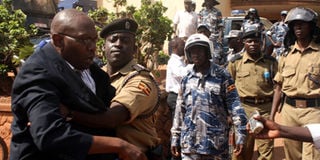Prime
Rwakafuzi, the human rights defender

Rwakafuuzi is denied access to the Central Police Station recently where some opposition leaders had been locked up. PHOTO BY FAISWAL KASIRYE
What you need to know:
Mr Ladislaus Rwakafuzi, a human rights advocate, who has for 20 years been fighting for human rights and providing free services to the needy whose rights have been abused, shared his experience with Saturday Monitor’s Juliet Kigongo. Below are excerpts:
How did you get involved in defending the September 2009 Buganda riots victims?
Well, after making a research of the number of people that lost their lives during the riots, the human rights body in New York forwarded me three cases to handle just because they knew I was interested and had the passion to fight for the needy. However, they were 50 cases but I do not know where the others went to. I think the majority of the people do not know their rights, they think that government has the final say on everything.
What has been your experience in representing these victims fighting for their rights?
The biggest problem we have is that the courts are very slow, so people think that they cannot be attended to in regards to their issues of human rights. I filed a case in 2004 but 10 years down the road it has never been concluded largely because judges and magistrates are very few. As a lawyer for those people whose rights have been abused, I think the delay in justice is a reason to why they think of ‘mob justice’ because they do not believe in courts anymore.
Do you think the victims of September 2009 riots will ever get justice?
It is not obvious that all of them will get justice. Some will not get it just because of the way in which cases are handled, while others may die before their cases are heard. But it is what we all wish for, that one day they all get justice although others are most likely not to get it.
What does this spell for the respect of human rights in Uganda?
It spells doom because the right to be heard is very basic. There is a right to be heard and the right for your complaint to be heard speedily. This breaches the constitutional guarantee that the person will get a speedy trial in his or her complaint.
You have been at the forefront of fighting for human rights, from your experience, are there any laws that you think should be scraped from the law books?
The law is good enough but the way it is applied makes it retardant, for example the law allows us to sue the government agent directly but then where the court orders for compensation in most cases comes from the Attorney General but he never pays and if so he does not do it on time. As I speak now, the Attorney General is going to pay claims of 2005. It is mockery of justice.



